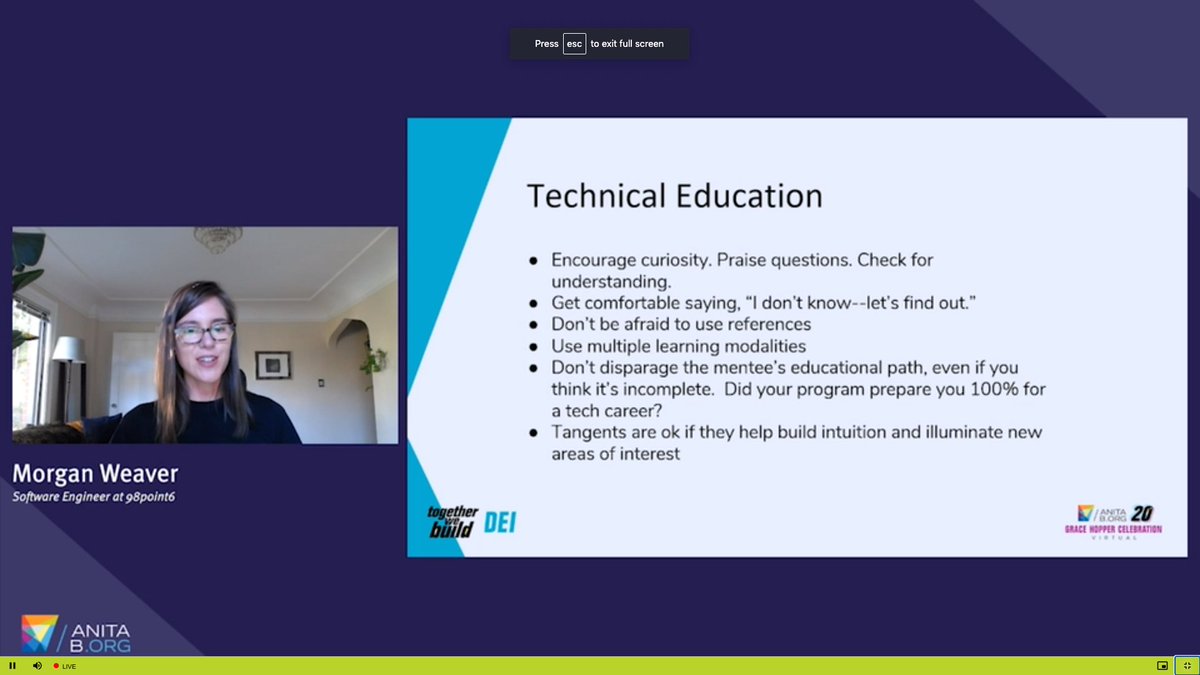Next session at #vGHC20 for me is pretty pertinent: Male Allies: The One "DEI" Thing a Male Ally Can Do Today - a panel including Glenn Block, David Graham, Jason Thompson, and Jeremiah Chan.
Note: DEI == Diversity, Equity, and Inclusion
#vGHC20 #ghc2020
Note: DEI == Diversity, Equity, and Inclusion
#vGHC20 #ghc2020
Sobering stat: study by the patent office 12.8% of patent inventors are women. The percentage growth in this area is actually slowing down.. only 2% growth in 15+ years.
This isn't just about recognition for patent creation there's a financial impact as well.
#vGHC20 #ghc2020
This isn't just about recognition for patent creation there's a financial impact as well.
#vGHC20 #ghc2020
Another stat: 9 of 10 venture capital dollars goes to while males according to our moderator Ha Nguyen. Through Spero Ventures she's working to help make those numbers more diverse.
#vGHC20 #ghc2020
#vGHC20 #ghc2020
Discussing why the panelists wanted to be a male Ally, some highlights:
- Seeing a female colleague act reserved in meetings dominated by male attendees
- Being personally subjected to discrimination
- Tech social media where women shared their experiences
#vGHC20 #ghc2020
- Seeing a female colleague act reserved in meetings dominated by male attendees
- Being personally subjected to discrimination
- Tech social media where women shared their experiences
#vGHC20 #ghc2020
Jeremiah called out a course called 'Design for Inclusion' which helped shed light on systemic discrimination. Really wish there were resource references that might have led to this training.
This training helped him personally identify with broader issues.
#vGHC20 #ghc2020
This training helped him personally identify with broader issues.
#vGHC20 #ghc2020
A point that the panelists have brought up a few times: the importance of using one's privilege to sponsor others and spearhead efforts to promote change.
This didn't hit me until earlier this year. Been trying to take action and make a difference since.
#vGHC20 #ghc2020
This didn't hit me until earlier this year. Been trying to take action and make a difference since.
#vGHC20 #ghc2020
Great take by Jason Thompson
- Allyship requires action which includes calling out instances of discrimination
#vGHC20 #ghc2020
- Allyship requires action which includes calling out instances of discrimination
#vGHC20 #ghc2020
Personal stories and panels focusing on issues like Unconscious Bias and impacts of discrimination are powerful tools in an organization.
These help build empathy across an organization and help those feeling ill-effects to understand they are not alone.
#vGHC20 #ghc2020
These help build empathy across an organization and help those feeling ill-effects to understand they are not alone.
#vGHC20 #ghc2020
I've never used Empathy Mapping but given that it's come up a few times throughout the conference I feel like it's something I should dive into for D&I.
#vGHC20 #ghc2020
#vGHC20 #ghc2020
Panelists are calling out the importance of measurement and setting tangible goals for D&I initiatives. Like most projects, it's difficult to prove or maintain success without aligning to metrics that can be tracked.
#vGHC20 #ghc2020
#vGHC20 #ghc2020
Data is the key... but what is the right data to look for in D&I?
- Promotions
- Terminations
- Composition
- Behaviors (ex. VCs asking men about opportunity while women get asked about risk)
#vGHC20 #ghc2020
- Promotions
- Terminations
- Composition
- Behaviors (ex. VCs asking men about opportunity while women get asked about risk)
#vGHC20 #ghc2020
D&I training... is it successful? Debatable. It's complicated, difficult, and infrequent. Compared to other complex topics (think Math) repetition is key. Expecting that people's behavior will change care of a single 45m session isn't realistic.
#vGHC20 #ghc2020
#vGHC20 #ghc2020
While establishing organizational empathy is a necessity it's important to follow it up with action. If systemic policies are embedding bias in an organization empathy does not help those being impacted. Action needs to follow.
#vGHC20 #ghc2020
#vGHC20 #ghc2020
Some quick closing statements on what we can do to be better Allies: educate yourself, educate others, "do the work," and 'pay at the top of the band.'
This was a great panel!
#vGHC20 #ghc2020
This was a great panel!
#vGHC20 #ghc2020

• • •
Missing some Tweet in this thread? You can try to
force a refresh








